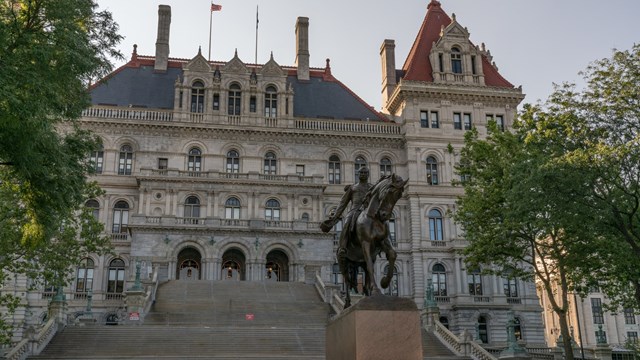Living in and running a co-op or condo can be stressful. And it's understandable that both the board of an association and those to whom it serves can find themselves overwhelmed, not only with vital information pertaining to their day-to-day, but also with which information boards must disclose to owners and shareholders, and which can better be withheld for the better of the association or corporation.
While a board is beholden to its fiduciary duty and various laws and statutes, and thus should be well aware of its obligations, the average resident may have no idea as to what documents they should be reviewing – and to what information they are entitled to or not.
Know Your Rights
“A cooperative shareholder, historically, has a broad right to examine corporate documents,” explains Leni Morrison Cummins, an attorney with the firm Cozen O'Connor, which has an office in New York. “A shareholder has the right to examine all corporate books and records where the request is made 'in good faith, and for a proper purpose.' These documents include – but are not limited to, minutes of shareholder meetings, a list of shareholders, annual balance sheets, and profit and loss statements.”
Many of the rights addressed above stem from the Business Corporation Law, specifically section 624, as William D. McCracken, a partner with the Manhattan-based Ganfer & Shore, observes. But he warns that, should a shareholder request a list of other shareholders, “they must first submit an affidavit affirming that they are seeking it for the business of the corporation and that they have not tried to sell such a list within the previous five years.”
Co-ops that fail to ask for an affidavit can find themselves in hot water. “I recall one shareholder who asked their co-op's managing agent for a list of the co-op's shareholders,” says McCracken. “The managing agent turned it over to her without first asking for an affidavit of proper purpose. A few days later, every shareholder in the building received a solicitation from this woman stating that she was a newly-licensed real estate broker and asking them to let her help them sell her apartments. Suffice it to say, this resulted in many justified complaints from the residents to the board which could have been avoided had the law been properly enforced.”
The Condo Side
While condos are not corporations and are thus not as limited by law regarding a unit owner's right to information, Cummins observes that, in recent years, there has been an increasing trend toward treating condos more like co-ops.
McCracken points out that, “beyond what is required by the condo's governing documents, Section 339-w of the Condominium Act merely requires that the board keep records of receipts and expenditures to be made available to unit owners. However, there have been several cases in recent years that have analogized to corporate common law a guidepost to a unit owner's common law right to information from their condominium. One case from 2016, for example, held that a unit owner had a right to inspect the condominium's monthly financial reports, building invoices, board meeting minutes and legal invoices, so long as they were doing so in good faith and for proper purpose. Thus, condo boards should not mistake the paucity of statutory law as a basis for denying any requests for information from unit owners.”
Owner Overreach
Now, it does not necessarily follow that, because an owner or shareholder may not be entitled to a specific document, they will not persist in attempting to obtain it. This is why it's important for all residents of an association to be aware and to respect the relationship between board and resident.
“Shareholders have, in some respects, unreasonable expectations,” admits Phyllis H. Weisberg, a managing partner at the law firm of Montgomery McCracken Walker & Rhoads LLP, which has offices in New Jersey and New York. “For example, shareholders seem to think that they can see board minutes, but they don't have an automatic right to do so. I know that some boards distribute them, but most don't, and they shouldn't be doing so. Because if the minutes indicate that Jane Doe is in dire financial straits and wants to borrow money, or work out a deal on her non-payment proceeding, that's something confidential that she wouldn't want to broadcast around. There are a lot of reasons that those minutes don't need to be made available. And sometimes, when a court mandates for whatever reason that they are made available, they will redact information that could prove embarrassing or prejudicial or whatnot.”
Then there are shareholders that demand to view all of the bids that boards have out on various projects, because they're suspicious as to how everything is going. “As a practical matter, the bids that are submitted are confidential, and if you're giving bids or information out to shareholders, you won't get anyone to bid at your building, as vendors will know those bids aren't confidential,” says Weisberg. “And generally, when I see people ask about the bids, it's mostly out of idle curiosity. Shareholders don't understand that there may be very good reasons why the co-op didn't accept the lowest bid. The decision not do so in and of itself is not, to me, evidence of wrongdoing. Maybe they didn't like something about the contract, or the contractor mainly worked on a different type of building. And I've heard horror stories of workers peering into apartments from outside, or even urinating off scaffolding.”
Of course, the proverbial busybody has other recourse than to assail the board with demands; if they feel as if they're being mismanaged, they can run themselves.
“The board is elected and is required by law to make decisions, save for when they have to go through the shareholder, like when they're amending a proprietary lease, amending bylaws, amending a certificate,” Weisberg continues. “But it's a representative democracy, so, if you don't like your representatives, you should mount a campaign.”
Neither party is infallible, but, as the board technically wields more power, perhaps erring on the side of transparency is preferable to shadowy meetings in dark conference rooms and parking garages.
“Overall, the general trend in corporate law has been towards greater access to information,” notes McCracken. “A recent example of this is an amendment to the BCL which seeks to provide more info to shareholders regarding potential conflicts of interest among board members. Section 727 of the BCL, which goes into effect on January 1, 2018, requires, among other things, that co-op boards provide an annual report to their shareholders on contracts in which board members are an interested party. Such a report would identify the other contracting party, the amount, purpose and term of the contract, the date on which the board voted on those contracts, and how each director voted on the contract. This will potentially entitle the shareholders to a great deal of information that was not previously available to them.”
Mike Odenthal is a staff writer at The Cooperator.










2 Comments
Leave a Comment